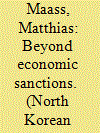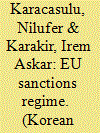|
|
|
Sort Order |
|
|
|
Items / Page
|
|
|
|
|
|
|
| Srl | Item |
| 1 |
ID:
109215


|
|
|
|
|
| Publication |
2011.
|
| Summary/Abstract |
In 2010, Taiwan's president, Ma Ying-jeou, explained the rationale for his country signing a major economic cooperation treaty with mainland China with the following statement: "We can handle diplomatic isolation, but economic isolation is fatal." This essay will make the argument that in the case of North Korea, the opposite is true: Economic isolation appears fairly manageable for Pyongyang, but diplomatic sanctions may in fact enhance a broad coercive strategy significantly.
This argument will be framed within the broader claim that in particular in the case of North Korea, sanctions have been conceptualized too narrowly-they have been viewed as economic coercion only. Instead, the argument is made that sanctioning states should consider the entire spectrum allowed under Chapter VII, Article 41 of the UN Charter.
The discussion in this article will be limited to the case of North Korea for reasons of space and the urgent need to address the deteriorating security situation on the Korean Peninsula, given the country's rise to quasi-nuclear power status. In light of this development, the sanctions regime currently in place needs to be reevaluated. A reorientation towards diplomatic sanctions will allow for a broader coercive strategy that is mindful of nuclear deterrence but goes beyond economic sanctions, which have not been successful in restricting Pyongyang's military-strategic objectives.
|
|
|
|
|
|
|
|
|
|
|
|
|
|
|
|
| 2 |
ID:
134081


|
|
|
|
|
| Publication |
2014.
|
| Summary/Abstract |
Although there is enormous discussion on normative power Europe, there is relatively less focus on the EU sanctions regime, though sanctions have become a useful foreign policy tool as the EU has applied sanctions within the framework of the Common Foreign and Security Policy. Looking at the literature, Kreutz focused on the EU sanctions regime in the time period of 1981-2004, during which sanctions
were used to accomplish normative goals. Yet, later on Brummer argued that although norms and values still play a role in the EU's sanctions regime, more often they were surpassed by security and economic interests. This article examines the previous work on the EU sanctions regime and tries to comprehend why the use of sanctions has increased over time as well as whether they have been "selectively" used. In addition, the article analyzes whether the normative commitment is crucial in the construction of the EU sanctions regime. The EU sanctions regime toward Iran is analyzed in particular, because as indicated by Santini and Tabrizi, Iran is the first country against which the EU has developed a new strategy out of weapons of mass destruction concerns, starting in 2006. Since 2010, EU foreign ministers have adopted tougher sanctions in an effort to block its controversial nuclear program. Recently, the Iran nuclear deal of November 2013 was interpreted as attributable to sanctions against Iran, in which EU sanctions have constituted a remarkable role, have proven effective.
|
|
|
|
|
|
|
|
|
|
|
|
|
|
|
|
|
|
|
|
|